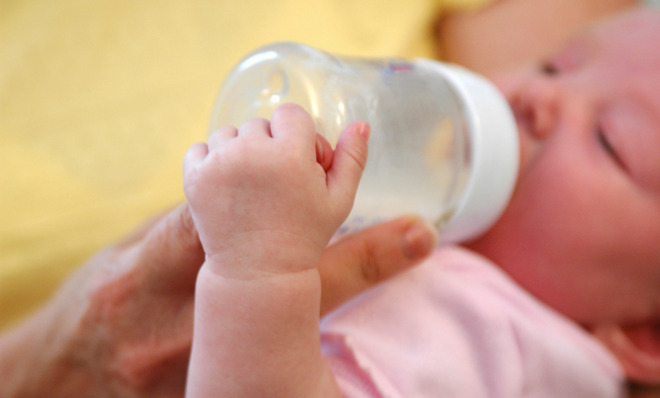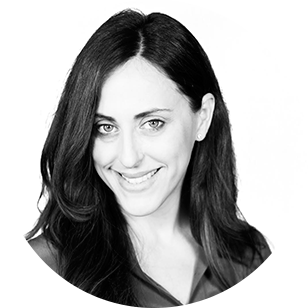How formula-feeding made my husband a better father
Breast is best — except for equal parenting


A free daily email with the biggest news stories of the day – and the best features from TheWeek.com
You are now subscribed
Your newsletter sign-up was successful
We're in the middle of National Breastfeeding Month and just wrapped up World Breastfeeding Awareness Week. As a result, mothers and lactation activists everywhere have been filling up social media feeds with reminders and selfies, pointing out just how beautiful breastfeeding is, and, most importantly, that it is best.
Breastfeeding has made much progress in recent years, largely because of these types of public awareness campaigns. For one, nursing has become a fashionable cause, a point driven home by actress Olivia Wilde's photoshoot in this month's Glamour, in which she appears in a designer dress with her baby on the boob. Also, in 2010 the United States passed a law requiring employers to accommodate breastfeeding women, the first of its kind to protect nursing mothers in the workplace.
But while these changes have undoubtedly been positive, this widespread enthusiasm for breastfeeding can blind us to the ways that breast is not always best.
The Week
Escape your echo chamber. Get the facts behind the news, plus analysis from multiple perspectives.

Sign up for The Week's Free Newsletters
From our morning news briefing to a weekly Good News Newsletter, get the best of The Week delivered directly to your inbox.
From our morning news briefing to a weekly Good News Newsletter, get the best of The Week delivered directly to your inbox.
Lately, there has been much discussion about the power of paternity leave to further level the playing field between men and women. The Atlantic's Liza Mundy writes:
[W]hatever else it may accomplish, [paternity leave] is a brilliant and ambitious form of social engineering: a behavior-modification tool that has been shown to boost male participation in the household, enhance female participation in the labor force, and promote gender equity in both domains. [The Atlantic]
If the goal is to continue untangling women from a destiny determined by biology and increase dads' domestic roles, then we should look at how breastfeeding, the single-biggest job for new moms, fits in here as well.
I formula-fed. Well, not exclusively at first. For the first three months, I produced enough milk to supplement the formula before my supply proved inadequate for my son's growing appetite. Early on, I consulted with a number of lactation consultants, pumped 10 times a day, and took herbs that made my sweat smell like maple syrup. I really wanted it to work; I liked breastfeeding, didn't find it painful, and not to brag or anything, but my son had an excellent latch. Still, my mammary glands wouldn't comply.
Initially, I was devastated. But before long the sorrow was eased by the extra sleep I was getting, meals I was eating, showers I was taking, and, soon enough, work I was publishing. I was no longer destined to be the primary caretaker.
A free daily email with the biggest news stories of the day – and the best features from TheWeek.com
The thing about babies is that they are difficult, but not at all complicated. Early on they require just four things: feeding, burping, soothing, and diaper changing. Thanks to bottles, my husband could now do them all, making him as capable of taking care of our son as I was. And so he did just that as often as he could.
While not intentional or planned — or even something I would have chosen — formula-feeding helped us create egalitarian habits that remain with us today. I'm not saying I live in an equal parenting paradise, but bringing in formula nudged us much closer to 50/50, domestically and professionally, than we would have landed otherwise.
A study published in 2012 found that "mothers who breastfeed for six months or longer suffer more severe and more prolonged earnings losses than do mothers who breastfeed for shorter durations or not at all." Yes, in an ideal world there would be no barriers to discourage breastfeeding at work. And yes, both partners should receive ample leave. These changes would certainly help get rid of much of the professional toll nursing can take — but, speaking as an eyewitness, I doubt they could even out the workload entirely. Feeding a baby is just way too large of a commitment, one that can only be equal when a man is as capable of doing it as a woman.
These are taboo things to say during Breastfeeding Awareness Month, but in the spirit of presenting a more nuanced version of nursing, I am going to say them anyway. For women struggling to breastfeed — be the reason physical, emotional, financial, or professional — go ahead and supplement with formula. The arguments against it — the fear of nipple confusion and the myriad benefits of breastmilk — have been largely overstated. Giving your kid a bottle with formula now and then won't harm them, but it will significantly lessen the burden on you, possibly for years to come. The fact is, breast is only sometimes natural, only sometimes best. It's up to us to figure out when and how.
Elissa Strauss writes about the intersection of gender and culture for TheWeek.com. She also writes regularly for Elle.com and the Jewish Daily Forward, where she is a weekly columnist.
-
 How the FCC’s ‘equal time’ rule works
How the FCC’s ‘equal time’ rule worksIn the Spotlight The law is at the heart of the Colbert-CBS conflict
-
 What is the endgame in the DHS shutdown?
What is the endgame in the DHS shutdown?Today’s Big Question Democrats want to rein in ICE’s immigration crackdown
-
 ‘Poor time management isn’t just an inconvenience’
‘Poor time management isn’t just an inconvenience’Instant Opinion Opinion, comment and editorials of the day
